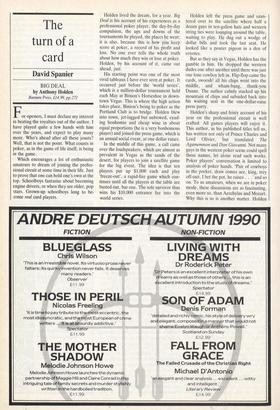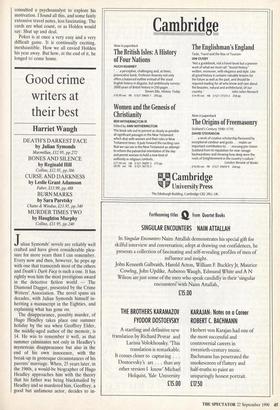The turn of a card
David Spanier
BIG DEAL by Anthony Holden
Bantam Press, £14.99, pp.272
For openers, I must declare my interest in beating the royalties out of the author. I have played quite a few hands with him over the years, and expect to play many more. Who's ahead after all these jousts? Well, that is not the point. What counts in poker, as in the game of life itself, is being in the game.
Which encourages a lot of enthusiastic amateurs to dream of joining the profes- sional circuit at some time in their life. Just to prove that one can hold one's own at the top. Schoolboys fantasise about becoming engine drivers, or when they are older, pop stars. Grown-up schoolboys long to be- come real card players. Holden lived the dream, for a year. Big Deal is his account of his experiences as a professional poker player, the day-by-day compulsion, the ups and downs of the tournaments he played, the places he went; it is also, because this is how you keep score at poker, a record of his profit and loss. No one ever tells the whole truth about how much they win or lose at poker. Holden, by his account of it, came out ahead, just.
His starting point was one of the most vivid tableaux I have ever seen at poker. It occurred just before the 'world series', which is a million-dollar tournament held each May at Binion's Horseshoe in down- town Vegas. This is where the high action takes place, Binion's being to poker as the Portland Club is to bridge. Holden blew into town, jet-lagged but unbowed, exud- ing bonhomie and cheap wine in about equal proportions (he is a very bonhomous player) and joined the press game, which is an annual social event, at one dollar raises.
In the middle of this game, a call came over the loudspeakers, which are almost as prevalent in Vegas as the sands of the desert, for players to join a satellite game for the big event. The idea is that ten players put up $1,000 each and play 'freeze-out', a rapid-fire game which con- tinues until all the players at the table are busted out, bar one. The sole survivor thus wins his $10,000 entrance fee into the world series. Holden left the press game and saun- tered over to the satellite where half a dozen guys in ten-gallon hats and western string ties were lounging around the table, waiting to play. He dug out a wodge of dollar bills and took the last seat. He looked like a pouter pigeon in a den of coyotes.
But as they say in Vegas, Holden has the gamble in him. He dropped the western dudes one after another until there was just one lone cowboy left in. Flip-flop came the cards, swoosh! all his chips went into the middle, and wham-bang, thank-you Duane. The author calmly stacked up his mountain of chips and subsided back into his waiting seat in the one-dollar-raise press party.
Holden's sharp and feisty account of his year on the professional circuit is well crafted. All games players will enjoy it. This author, as his published titles tell us, has written not only of Prince Charles and Lord Olivier, but translated The Agamemnon and Don Giovanni. Not many guys in the western poker scene could spell these names, let alone read such works. Poker players' conversation is limited to analysis of poker hands. 'Pair of cowboys in the pocket, draw comes ace, king, trey off-suit, I bet the pot, he raises . . .' and so on. To us amateurs, when we are in poker mode, these discussions are as fascinating, even more so, than Aeschylus and Mozart. Why this is so is another matter. Holden consulted a psychoanalyst to explore his motivation. I found all this, and some fairly extensive travel notes, less fascinating. The cards are what count, or as Holden would say: Shut up and deal.
Poker is at once a very easy and a very difficult game. It is continually exciting, inexhaustible. How we all envied Holden his year away. But how, at the end of it, he longed to come home.



































































 Previous page
Previous page